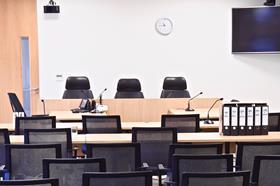The Solicitors Disciplinary Tribunal has taken the unusual step of agreeing to stay a prosecution of a lawyer whose health prevented him from appearing.

The tribunal agreed to effectively park the case after years of adjournments and no positive sign that David Haigh would be fit enough to answer the charges made against him.
Haigh, a former managing director of Leeds United Football Club, is alleged to have misappropriated £617,000 whilst acting on behalf of Dubai-based investment firm GFH, a company client of global firm Gibson Dunn & Crutcher.
The allegations, which date back to events which happened almost 10 years ago, are that he instructed the firm to make 10 illegitimate payments from funds held for GFH in the client account, and provided false details to the firm with invoices which contained his personal bank account.
Proceedings were issued in 2018 but Haigh has not been able to serve an answer owing to health issues. A series of adjournments, each time backed by the tribunal, have been applied since then.
In a hearing last month, the tribunal heard that medical reports have consistently come to the same conclusion, namely that Haigh was not fit to participate in proceedings.
The most recent report stated that Haigh’s condition has not improved and there is no timeframe for recovery, although it is envisaged his health will at some point get better so as to allow him to take part.
The SRA therefore applied for a stay so Haigh could focus on his recovery. It was submitted that he does not hold a practicing certificate and that if he applied for one in future, the regulator could then attempt to have the stay lifted.
The risk of memories fading over time was negligible, the tribunal said, because the matter was so old that people were likely to have forgotten details in any case.
The tribunal recognised these were serious allegations but said they related directly to his work as a solicitor and were financial in nature. Given he was no longer practising, the risk of his coming into contact with clients was limited.
The stay was agreed indefinitely with either party having liberty to apply for it to be lifted. There was no order for costs.






























